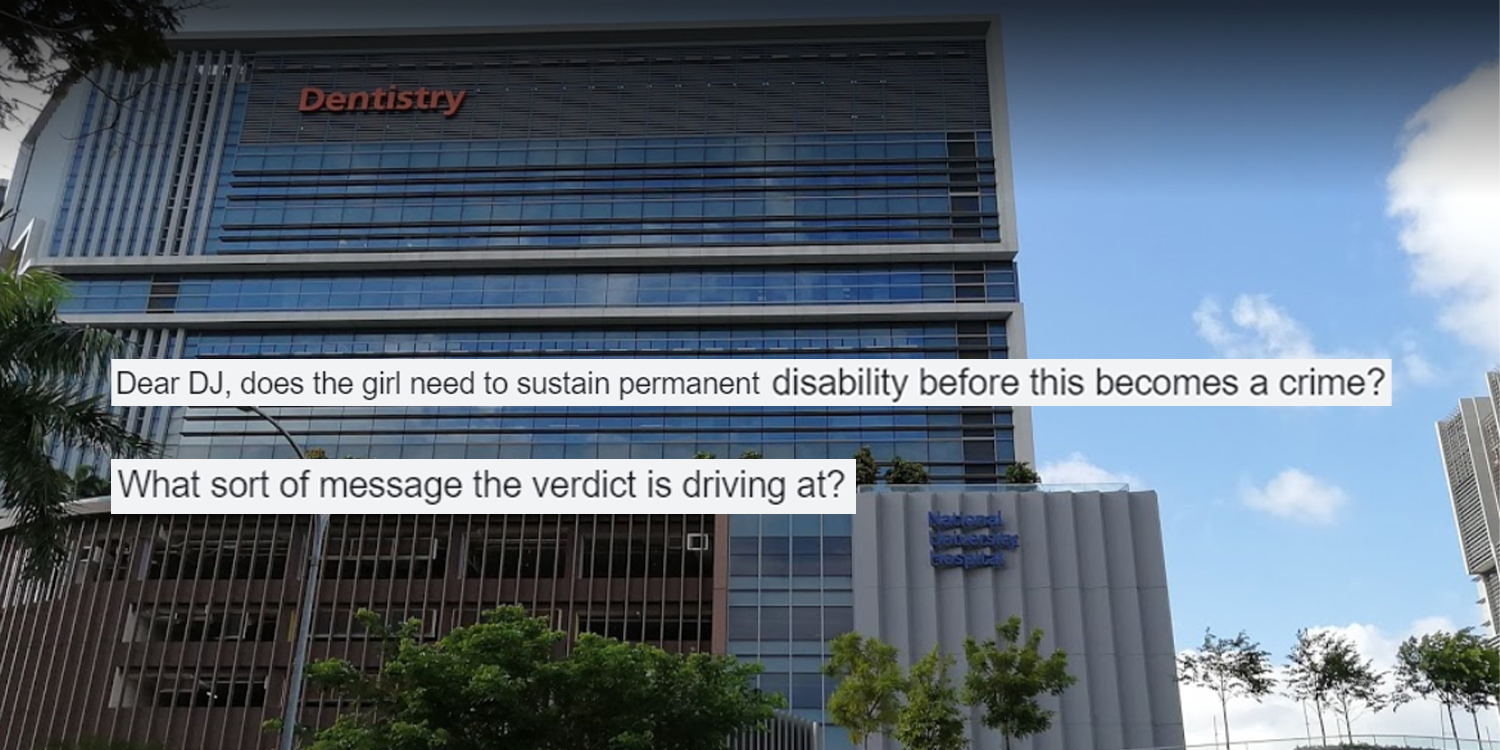Netizens Cry Foul Over NUS Dentistry Student’s Sentence For Strangulation
UPDATE (20 Jul, 3.30pm): NUS published an update on Facebook, saying that the student is currently serving a suspension and is not allowed on campus.
They added that NUS does not have the jurisdiction to investigate matters beyond the university, and will have to await completion of court proceedings to close the case.
As pending disciplinary proceedings are ongoing, they stressed that students who breach NUS Statutes and Regulations face suspension and expulsion.
–
A court case involving a university student is gripping the Internet, with many believing that he got away with a lighter sentence than he should have.
After strangling his ex-girlfriend over a breakup, Yin Zi Qin pleaded guilty to voluntarily causing hurt, but escaped having a criminal record.
Channel NewsAsia (CNA) reported on Friday (17 Jul) that Yin, a 23-year-old NUS dentistry student, was sentenced to a 12-day detention order, a day reporting order for 5 months with counselling, and an order to complete 80 hours of community service over a year.
The community-based sentence will leave Yin with no criminal record. But netizens appear angered by what seems to be a minor sentence in proportion to the offence and the trauma it caused.
Student entered victim’s home after breakup
CNA reported that Yin and the victim had dated for about 2 years until May 2019, when she broke up with him over WhatsApp.
That day, he entered the premises of the victim’s compound using an access card she’d given him. The victim, who was out with her friends when this happened, returned home upon hearing of what he did.
They climbed into her bedroom through another unit, which was used as a showroom.
 Image for illustration purposes only.
Image for illustration purposes only.
Source
Strangled victim as he was ‘upset’
Yin tried to convince her to not break up, but when that failed, he hit his head against the wall and then strangled her after saying he was upset.
When she screamed, he pressed his thumb into her eye, causing bleeding. Eventually, she blacked out and when she came to, Yin apologised and climbed out of her bedroom through the window.
But when he overheard a coversation between the victim and her mum, he came back, intending to seek forgiveness.
However, the victim’s stepfather saw Yin and pinned him to the ground — police were called in afterwards.
Victim suffers from psychological trauma
The victim was sent to hospital, where she was given 3 weeks of medical leave. She ended up with an eye infection that took 5 months to heal, and had to wear an eye patch.
She also reported paranoia over potentially bumping into Yin in school, and suffers from insomnia as well as nightmares of him attacking her in her room.
The paranoia also spread to her family, as her family members check that windows and doors in their house are locked every night.
The court found that Yin wasn’t at high risk of reoffending, and also considered his relative youth, lack of past convictions, and ability to rehabilitate.
Netizens question light sentence
When Yin pleaded guilty to the offence of voluntarily causing hurt and his occupation as a dentistry student in NUS was revealed, netizens seemed concerned that he’d get off lightly.
They questioned whether Yin’s education level helped him to avoid a harsher sentence.
Netizens were also concerned over how the victim blacked out and suffered an eye injury, as well as the trauma she received after the incident.
While the court found his offence minor, the facts seemingly didn’t mirror that. He could’ve been jailed up to 2 years and/or fined up to $5,000.
Perception that those from good schools get lighter sentences may grow
There’ve been cases where people see jail time for seemingly less, such as spitting over a railing in a mall.
While each case is decided on its own facts rather than compared to others, there may be growing concern over how the law is applied to different people.
Such concern can easily lead to a perception that those with good grades or in good schools can get away with more than others.
Public perception should not dictate how the law is applied, but netizens will definitely stop and wonder why certain people appear to get lighter sentences.
Featured image adapted from Google Maps.












